
More Helpful Content
If you run an online business, understanding B2B fulfillment is key. It shows why building good business relationships, finding the right suppliers, managing your warehouse well, and giving value to customers matter.
With this in mind, in this post, we've got a complete guide on B2B fulfillment including what it is, how it works, its pros and cons, and tips on choosing strategies
Whether you're a pro or just starting, let's make your B2B journey a breeze!
B2B (business-to-business) fulfillment refers to the process of fulfilling orders for other businesses or retailers rather than directly to individual consumers.
This occurs when a business:
B2B orders often involve bulk shipments, using freight for larger orders and parcel services for smaller ones.
The most common form of B2B fulfillment is sending wholesale orders to retailers for resale to consumers. Some B2B warehouses function more like distribution centers than traditional logistics companies.
Opting for B2B 3PL (third-party logistics) allows you to outsource a crucial part of your supply chain. A 3PL service manages logistics operations from warehousing to delivery, freeing you to focus on other aspects of your business.
Your B2B order fulfillment provider handles the challenges of wholesale delivery effectively, giving you the confidence to pursue partnerships with companies that can contribute to your business's success.
👉 Read More:
You might wonder: How does B2B differ from B2C?
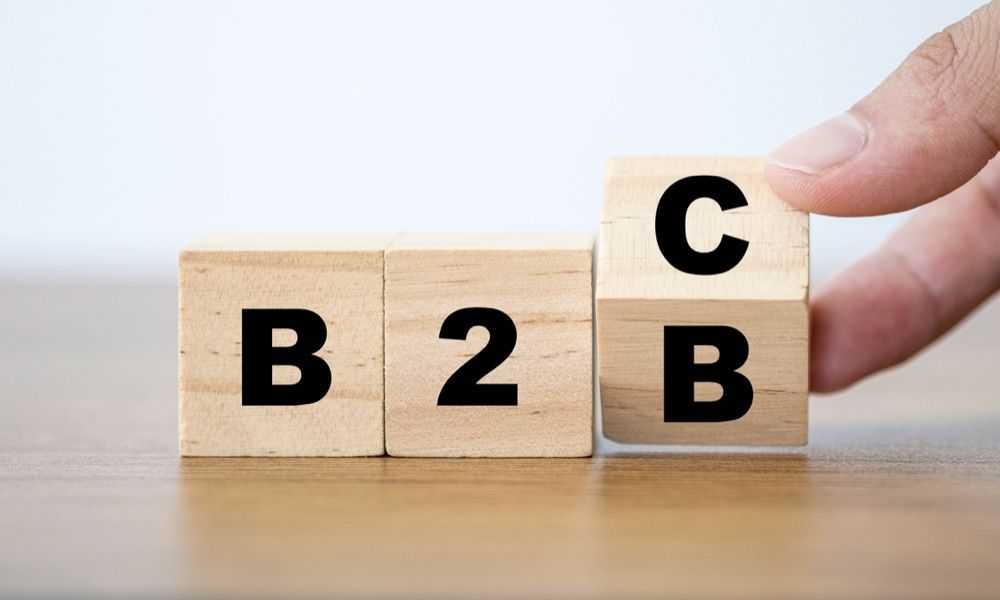
The key difference between B2B (business-to-business) and B2C (business-to-consumer) lies in the size of the orders. B2B deals with big, bulk orders, while B2C handles smaller quantities and lighter deliveries.
Take a closer look at some main differences between these two fulfillment methods!
B2B orders often involve larger quantities due to businesses sourcing materials for production, and shipments are commonly in bulk. Orders may be substantial in size and require special handling. Oftentimes, your B2B customers will only order every few months, but the purchase quantity will be much larger.
Whereas, B2C orders usually have fewer items in an order, but are being delivered directly to different residential locations.
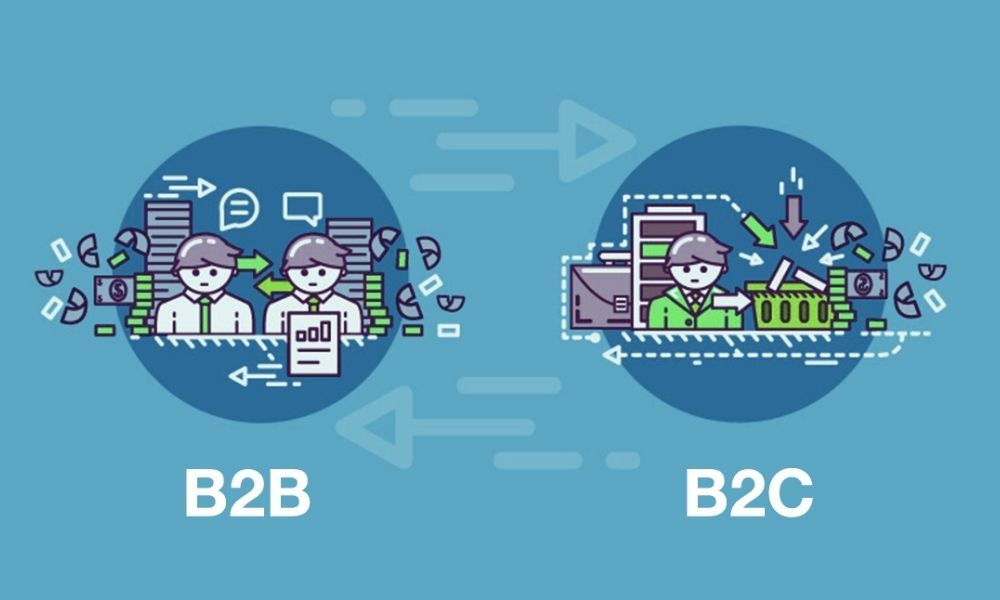
B2B shipments utilize complex logistics and freight services for larger orders, often palletized.
On the other hand, B2C orders use parcel services, with a focus on faster and flexible delivery options to individual consumers.
B2B shipments face industry-specific regulations and standards, including hazardous materials and international shipping. B2B orders must comply with complex regulations, especially when it comes to EDI (electronic data interchange).
B2B fulfillment costs are more expensive because of larger orders and complex logistics, involving more labor and handling equipment.
In contrast, B2C costs vary based on order size and shipping expectations. B2B necessitates upfront technology investments, while B2C emphasizes enhancing the customer experience.
Ensuring timely delivery is the utmost priority in every business model.
B2B fulfillment is time-sensitive, requiring adherence to regulations for on-time delivery. Guaranteeing delivery dates helps B2B businesses build trust with other businesses and retailers.
In some cases, luckily, B2B fulfillment may be less time-sensitive than B2C if partnering businesses understand longer lead times for bulk orders.
At the same time, B2C fulfillment also prioritizes speed to meet consumer expectations for quick processing and delivery, often offering expedited shipping options such as 2-day shipping.
The B2B fulfillment process involves a series of steps aimed at efficiently and accurately processing and delivering products from the manufacturer or supplier to the business or retailer.
Here is a step-by-step overview of how B2B fulfillment companies work.
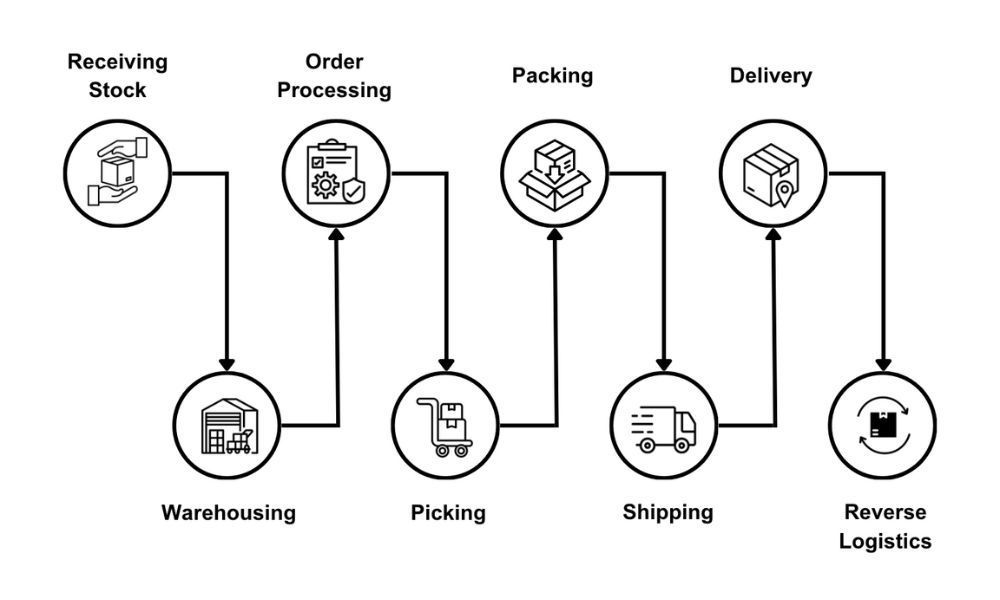
This is where products first come into the warehouse or distribution center. It involves receiving stock including raw materials, parts, or finished goods delivered from an outside source to the company or manufacturer.
Warehouse staff carefully inspect, count, and verify the received goods to make sure they match the purchase orders and meet the expected descriptions.
Once confirmed, the goods are placed in specific storage spots in the warehouse for easy organization during the next steps. They also get updated in the inventory system in real-time, often using SKUs or barcodes for quick tracking and retrieval.
This step is vital for keeping the warehouse organized and efficient.
Once goods successfully pass through the verification process, they're placed in specific areas within the warehouse, strategically chosen to use space well and make order picking easier later on.
As items find their designated spots, inventory management systems are promptly updated in real-time, ensuring accurate and up-to-date information on stock levels. Additionally, using identifiers like SKUs or barcodes and clear labeling helps easily track and identify goods.
Ideally, items are stored only as long as needed to organize timely distribution for current sales. Choosing a quick turnaround over long-term storage for future B2B sales helps cut storage costs and keeps cash flow free.
B2B order processing involves efficiently managing and monitoring the orders made by your B2B customers. This includes all the administration tasks and fulfillment processes for the smooth dispatch of products.
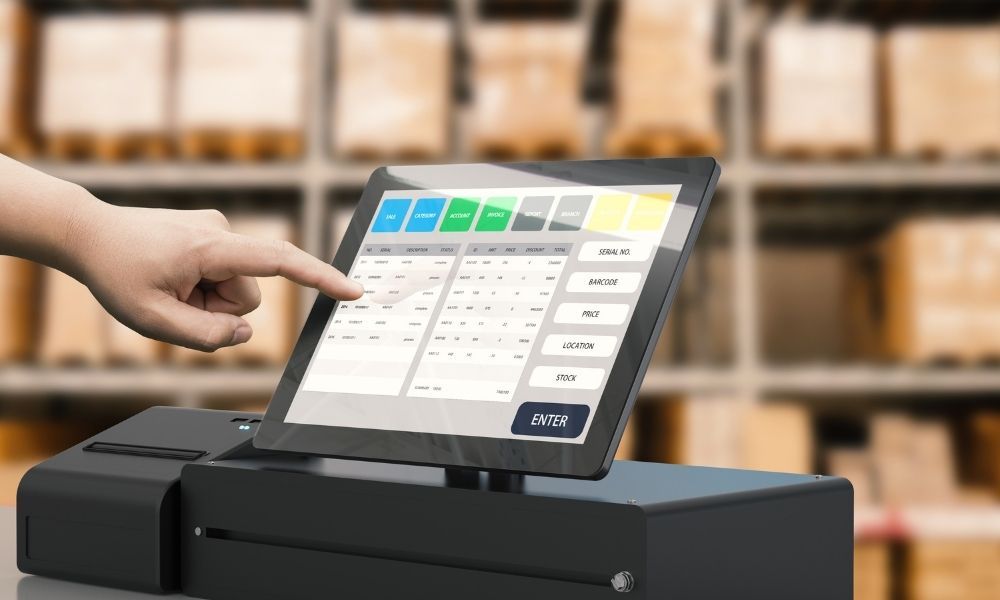
Most B2B businesses utilize order management software to enhance this process by providing clear guidelines for activities like product picking and packing, tailored to the specifics of each customer order.
Additionally, effective order processing includes ongoing communication with the business customer. This is key to addressing any updates or issues along the way, making sure the whole process runs smoothly.
Order picking is the process of gathering products from the warehouse shelves to fulfill specific customer orders. Some main specific information include:
It's like assembling a puzzle, where warehouse staff follow a carefully designed plan, often guided by order management systems or pick lists.
Once the order picker collects all the required items, they are ready for the next phase of the fulfillment process. Efficient order picking is crucial for timely and accurate order fulfillment, ensuring that the right products are gathered in the right quantities to meet the business customer's requirements.
Order packing is where the collected products are carefully and securely packaged for shipment to the business customer.
Once the items are picked up in the warehouse, they move to the packing area, ensuring that each product is appropriately protected and labeled.
The packaging process often follows specific guidelines, considering the nature of the products and any special requirements outlined by the customer.
The choice of packing materials aims to make shipments both efficient and cost-effective. Packing materials must be sturdy enough to prevent damage but light enough to minimize shipping costs.
Besides, freight and shipping companies also have their own rules for packaging to enhance their efficiency and profits.
Once an order is packed and sealed, a label is stuck on it, and off it goes for shipping.
The shipping process involves picking the right way to send it based on size, weight, and where it's headed. This usually means working with shipping companies to make sure the goods get where they need to be on time and safely.
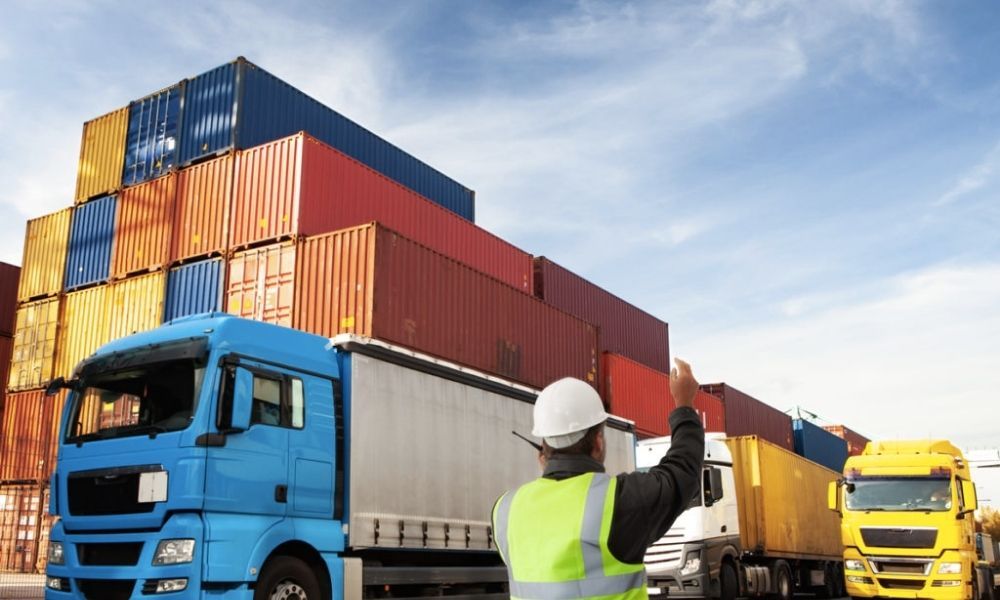
Meeting delivery deadlines and providing accurate tracking information are crucial aspects of the shipping process, contributing to overall customer satisfaction in the B2B supply chain.
Delivery is the last phase when the shipped orders reach the business customer. After the goods are dispatched, they move through the selected delivery method, whether it's a courier service or a freight carrier.
This process ensures that the products get to the specified location within the agreed-upon timeframe. B2B delivery often involves using a mix of transportation methods and more than one carrier.
This combination, known as hybrid shipping, offers improved cost efficiency, and a variety of delivery options, and ensures timely and reliable B2B fulfillment deliveries.
Making sure customers are happy doesn't just end with selling products; it also involves handling returns efficiently.
When a customer sends something back for a refund or exchange, B2B businesses go through a process called reverse logistics. This means the company quickly checks if the item is in good condition to be resold.
If it's damaged, it can be fixed or needs to be recycled or written off. After checking and managing the returned items, a refund or credit for the customer will be processed.
However, it's not just about the transaction, you should look at the bigger picture. By analyzing why products are returned, especially if it happens a lot, B2B businesses can figure out what's causing the issue and find ways to fix it for a better overall customer experience.
Outsourcing B2B fulfillment is the process of entrusting order processing, warehousing, and shipping to a third-party provider.
This process comes with distinct advantages and disadvantages that you need to know to guarantee an accurate estimation of the outsourced cost.

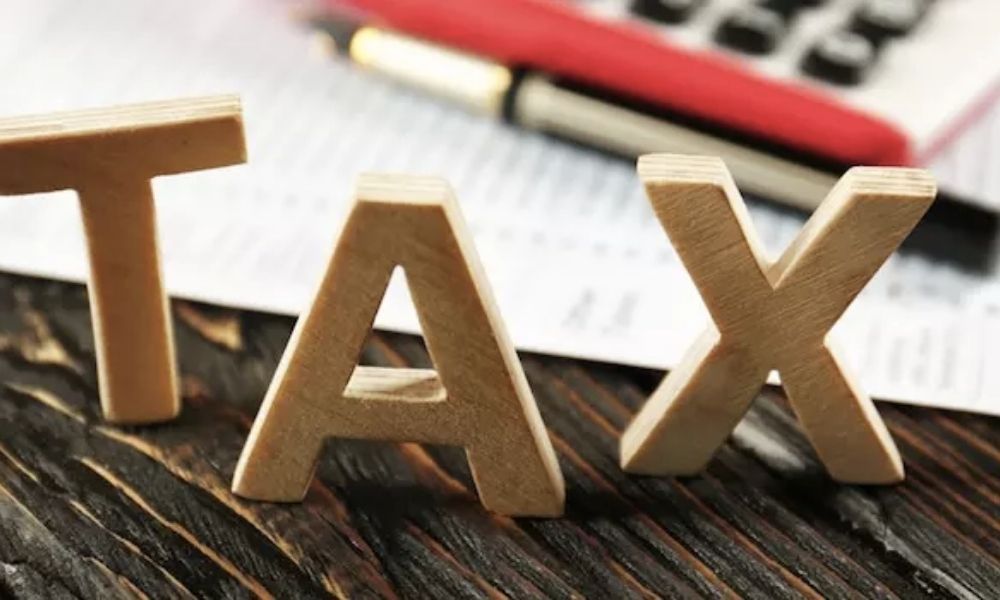
Picking the right B2B order fulfillment partner is vital for your business to run smoothly. You need to make sure they can meet your requirements, have a history of delivering on time, understand B2B fulfillment, and provide good customer service.
Consider the following three key factors:
EDI (Electronic Data Interchange) is a process that combines systems and processes, enabling retailers to exchange documents and transactions with suppliers, vendors, and brands in a standardized electronic format.
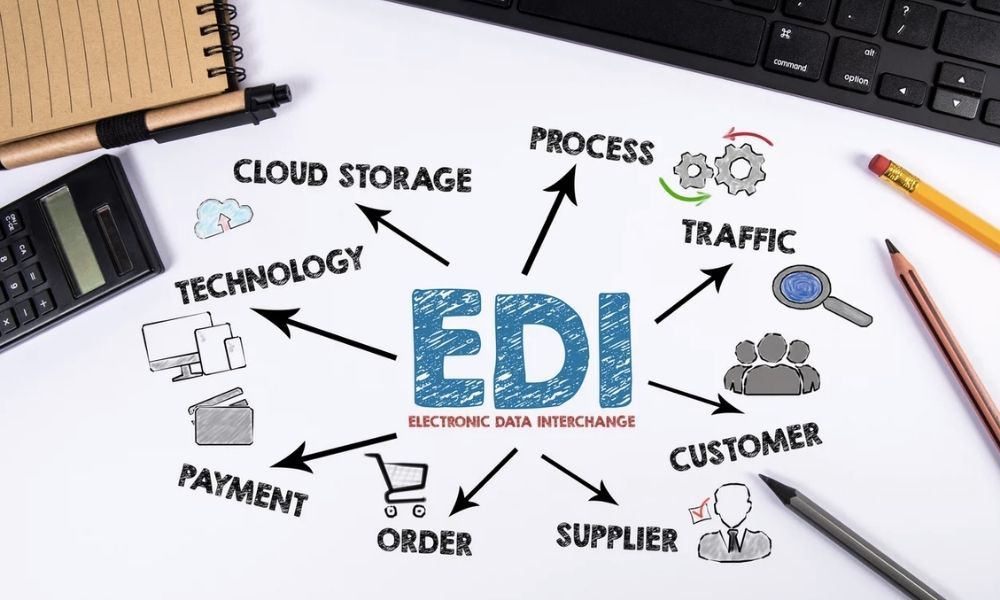
For example, they can digitally send a purchase order instead of using paper. So, make sure your chosen B2B fulfillment provider is EDI compliant. They will help automate and reduce errors in the order fulfillment process.
Always look at the tools and software offered by the fulfillment provider. Robust inventory management systems, order processing software, and tracking tools are essential for effective B2B order fulfillment.
You should look for a partner that provides user-friendly and technologically advanced solutions to optimize the entire fulfillment process, from order placement to shipment.
The responsiveness and quality of customer care are critical factors, especially when issues arise.
You need to choose a fulfillment partner with a dedicated and responsive customer care team. This ensures quick resolution of any problems, transparent effective communication, and a reliable point of contact for any concerns.
Keep in mind good customer care always contributes significantly to the overall success of your B2B order fulfillment process.
Are you searching for the perfect fulfillment partner? Look no further! EFEX is your trusted ally in B2B and Retail Fulfillment, dedicated to putting your business to a higher level.
Our advanced EDI-compliant technology enables you to leverage the extensive capabilities of B2B, allowing you to worry less and expand more.
Besides, our seamless integration with robust, self-built WMS software ensures precision in processing over 10,000 orders daily, achieving a 100% SLA commitment at every step. It allows you to track and manage everything regarding fulfillment, including orders, packages, inventory, and delivery in one location.
Above all, we prioritize customer satisfaction as the ultimate measure of our success. Our dedicated customer support team is always ready to promptly address your concerns and answer any questions you may have.
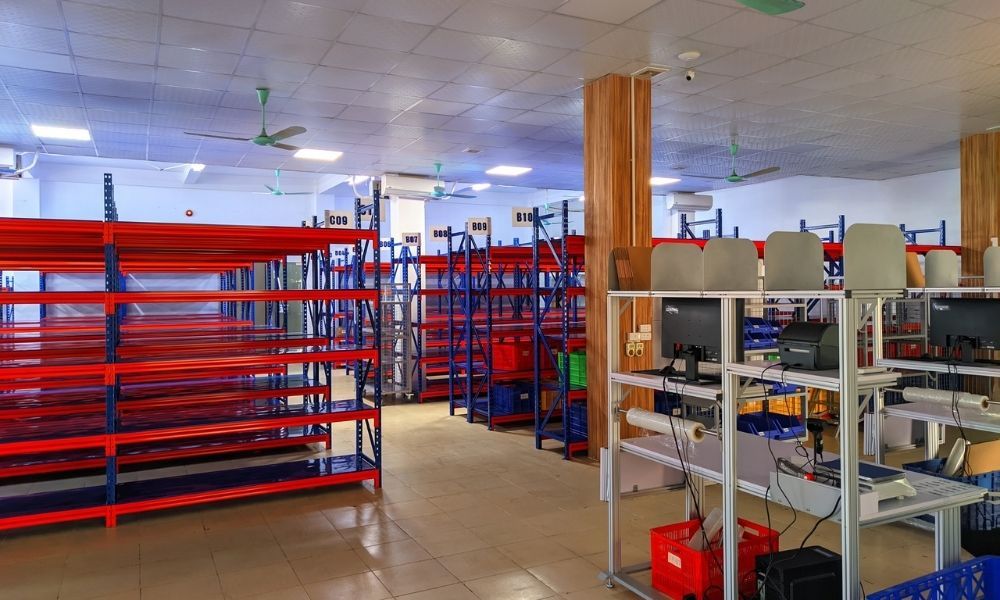
We pride ourselves on specialized expertise in B2B fulfillment and a focus on retail optimization. In EFEX, we bring you cost-effective solutions with transparent billing that save resources while providing global reach through our network of fulfillment centers.
With us, it's not just about meeting expectations, we're here to exceed them with innovation and excellence.
And there you have it! This guide covered all things B2B fulfillment, making your success journey clearer.
As B2B e-commerce fulfillment continues to evolve, more and more businesses embrace B2B advantages. Now is an excellent time to expand your e-commerce, gain a competitive edge, and enhance your B2B fulfillment services.
Considering outsourcing? Join hands with EFEX and experience fulfillment excellence. Your success is our priority!


